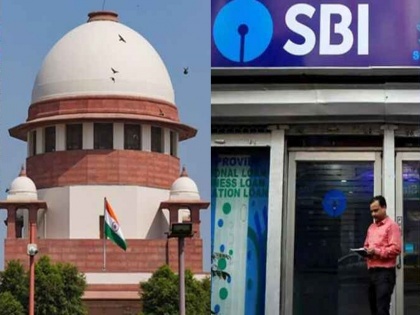Contempt Petition in Supreme Court Over SBI’s Failure To Disclose Electoral Bonds Details
By Lokmat English Desk | Published: March 7, 2024 11:26 AM2024-03-07T11:26:52+5:302024-03-07T11:27:55+5:30
The Association for Democratic Reforms (ADR) on Thursday filed a contempt petition in the Supreme Court, accusing the State ...

Contempt Petition in Supreme Court Over SBI’s Failure To Disclose Electoral Bonds Details
The Association for Democratic Reforms (ADR) on Thursday filed a contempt petition in the Supreme Court, accusing the State Bank of India (SBI) of defying its order to disclose details of electoral bonds. Advocate Prashant Bhushan sought an urgent hearing for the petition, arguing that SBI's non-compliance undermines transparency in political funding.
Bhushan has brought up a contempt petition before Chief Justice of India DY Chandrachud, seeking urgent listing. He noted that the SBI has applied for an extension until June 30 to provide information, a matter likely to be addressed on Monday. Bhushan urged that the contempt petition be included alongside SBI's application. CJI instructed Bhushan to email the request along with the application number details.
The contempt petition lodged in the highest court alleges the SBI of intentional disobedience and requests the commencement of contempt proceedings. According to ADR, SBI, the issuer of electoral bonds, has neglected to provide crucial details regarding the bonds to the Election Commission of India (ECI) within the court-mandated timeframe. The petition, submitted subsequent to the Supreme Court's ruling on February 15, underscores the immediate necessity of divulging information pertaining to electoral bonds.
ADR has argued that the extension request made by the SBI is 'mala fide,' suggesting it is done with ill intent, and aimed at obstructing transparency efforts ahead of the impending Lok Sabha elections. They contest the SBI's claim of complexity in decoding and compiling data from the sale of electoral bonds, stating that the bank already has the essential infrastructure in place to swiftly gather and disclose this information. ADR points out that SBI's IT system, specifically designed for managing electoral bonds, is capable of generating reports based on the unique identification numbers assigned to each bond. Therefore, they dispute the necessity of the extension and argue that it is merely a tactic to delay the disclosure of crucial information.
Open in app